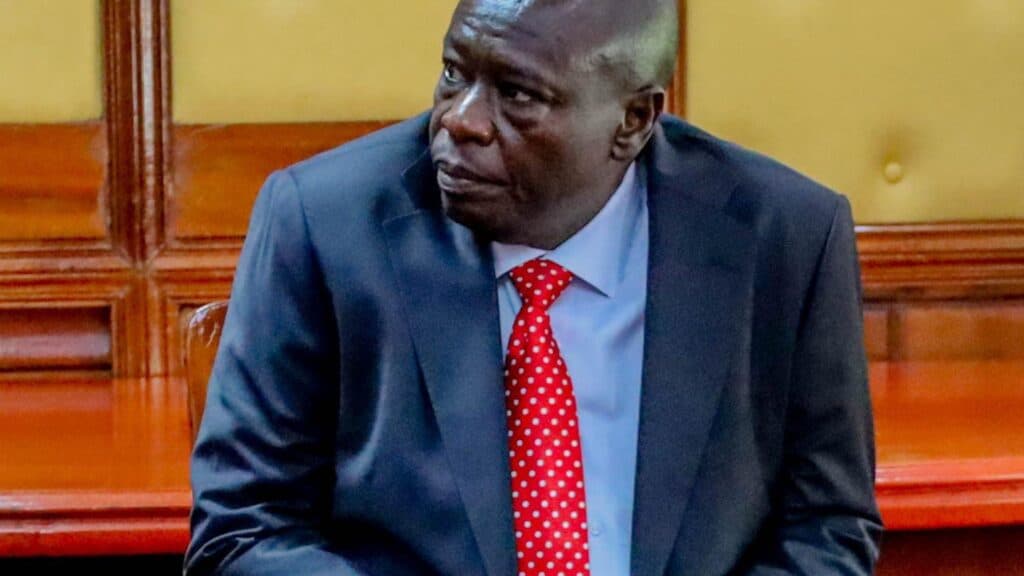We're loading the full news article for you. This includes the article content, images, author information, and related articles.
Director of Public Prosecutions Renson Ingonga reveals that the case against former Deputy President Rigathi Gachagua faltered due to inadequate evidence from the NCIC, highlighting systemic challenges in prosecuting high-profile incitement cases in Kenya.

NAIROBI, KENYA – The Director of Public Prosecutions (DPP), Renson Ingonga, has announced that a hate speech case against former Deputy President Rigathi Gachagua could not proceed to trial due to insufficient evidence. Speaking before the Senate National Cohesion Committee on Tuesday, November 25, 2025, Ingonga stated that the investigative file submitted by the National Cohesion and Integration Commission (NCIC) failed to meet the necessary prosecutorial threshold required to build a watertight case.
“The case of former DP Gachagua could not proceed because the evidence was not adequate,” Ingonga told the committee, which is chaired by Marsabit Senator Mohamed Chute. “If a case does not meet the prosecutorial threshold, then there is nothing we can do. We cannot just go to court for the sake of it.”
The DPP elaborated that his office is cautious about pursuing cases with weak evidentiary foundations to avoid potential lawsuits against the state for malicious prosecution should the accused be acquitted. This revelation underscores a persistent challenge in Kenya's justice system: the difficulty in successfully prosecuting high-profile individuals accused of hate speech and incitement, often due to investigative gaps, witness reluctance, and legal ambiguities.
The case in question stems from several controversial public statements made by Mr. Gachagua in 2025. The NCIC had been investigating at least two prominent instances of alleged hate speech.
In one instance, in February 2025, Gachagua made remarks in Meru County concerning petitions seeking the removal of Chief Justice Martha Koome. He allegedly warned President William Ruto against visiting the county if the Chief Justice, who hails from the region, was removed from office, framing the alleged plot as being ethnically motivated. The NCIC issued a formal warning to Gachagua at the time, stating his utterances were “likely to undermine harmonious and peaceful co-existence of different ethnic communities.”
In another widely reported incident in May 2025, Gachagua was summoned by the NCIC after comparing the potential fallout of a rigged 2027 election to the 2007/2008 post-election violence, stating it would make the deadly episode “look like a Christmas party.” The remarks, which Gachagua later defended as a “precautionary statement” to the electoral commission, were condemned by the NCIC as “dangerously insensitive to the pain, loss, and trauma suffered by thousands of Kenyans.”
DPP Ingonga's testimony before the Senate committee shed light on broader systemic issues. He revealed that a staggering 99 percent of hate speech files forwarded to his office by investigative agencies like the NCIC are returned for failing to meet the evidentiary standards for prosecution. He also pointed to legal weaknesses, noting that the National Cohesion and Integration Act is poorly defined, with ambiguity around what legally constitutes inflammatory remarks, making interpretation difficult for investigators and the courts.
These challenges are not new. Legal analysts and human rights bodies have long pointed to political interference, intimidation of witnesses, and a lack of successful convictions as major impediments to curbing hate speech in Kenya. The failure to prosecute powerful political figures is often seen as perpetuating a cycle of impunity, particularly around election periods.
The DPP's office has consistently maintained that its decisions are based on the sufficiency of evidence provided by investigative bodies. Ingonga told the Senate committee that his office relies entirely on agencies like the NCIC and the Directorate of Criminal Investigations (DCI) to collect and verify evidence before a prosecution can be mounted. “It is not the office of the DPP that fails to prosecute these people; it is evidence collection that is the problem,” he asserted.
The collapse of the case against Gachagua adds to a growing list of high-profile incitement and hate speech investigations that have failed to result in a conviction, raising critical questions about the effectiveness of the legal and institutional frameworks designed to promote national cohesion and hold leaders accountable for their public utterances. As the 2027 general election approaches, the pressure on the NCIC, DCI, and ODPP to enforce the law decisively and impartially remains a matter of significant public interest for Kenya and the East Africa region.
Keep the conversation in one place—threads here stay linked to the story and in the forums.
Sign in to start a discussion
Start a conversation about this story and keep it linked here.
Other hot threads
E-sports and Gaming Community in Kenya
Active 9 months ago
The Role of Technology in Modern Agriculture (AgriTech)
Active 9 months ago
Popular Recreational Activities Across Counties
Active 9 months ago
Investing in Youth Sports Development Programs
Active 9 months ago
Key figures and persons of interest featured in this article